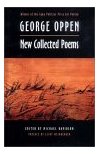|
Essays
What a welcome gift—this New Collected Poems from one of the Modernist's most humanely engaged poets! While other poets, such as Ginsberg, fused their poetics into a political religion, only Oppen found himself speechless before what Michael Davidson, this volume's editor, described as "the inability of art to provide an adequate image of human suffering." Oppen, who in the 1930s along with his wife Mary became an important activist in the Communist party, published his first book in 1934. In the face of the injustices of Capitalism and the social welfare crisis of the Depression, he not only refused his wealthy upbringing, but also set aside poetry for twenty-five years. The Oppens then devoted themselves until he was drafted to those who had fallen on hard times. He won a Purple Heart in World War II, but the terrors of the McCarthy years sent him and his family to Mexico. When he returned to the U.S. in the 1960s he reentered the literary community, and from his imposed silence brought forth poetry remarkable for its chiseled intelligence. As one of the original Objectivists, Oppen always strove for a sincere and individual response to the world. The books that followed culminated in one of the few Pulitzer Prizes given to a struggling poet outside the mainstream, and to major awards for his life's work. What ultimately impresses in this story is the work itself. In many ways he was the purest of the Objectivists. Seldom obscure or unintelligible, his work is unsentimental and so finely nurtured that you can see Oppen's mind at work on the page, and yet also see clearly the object at hand. Wholesome in its devotion to the human, it describes sparely and beautifully his life's form, and the life of those around him. It remains political in the truest sense—without dogmatism, spin, or rhetoric, and with much lyric intensity. It seeks knowledge liberally. It embraces consciousness. It upholds speech as a revelatory instrument. How much we can learn from such mastery as this: "waking who knows // the great open // doors of the tall // buildings and the grid / of the streets the seed // is a place the stone / is a place mind // will burn the world down alone / and transparent // will burn the world down tho the starlight is / part of ourselves." ("Waking Who Know")
|
|||||
